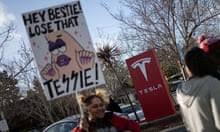Guardian
1M
22

Image Credit: Guardian
‘Major brand worries’: Just how toxic is Elon Musk for Tesla?
- After Elon Musk endorsed Alternative für Deutschland (AfD), Tesla faced a 76% drop in car registrations in Germany, while overall electric vehicle registrations increased by 31%.
- Musk's political ties have become intertwined with Tesla's valuation, with his support for rightwing leaders and involvement with Trump's administration possibly affecting the brand's image.
- Activists staged protests at Tesla stores, questioning whether Musk's political influence is damaging the brand synonymous with electric cars and climate action.
- Despite Tesla being a top electric car producer, sales dropped for the first time in years, raising concerns about customer retention and potential impacts on the brand.
- Analysts like Dan Ives offer differing views on Tesla's future, with Ives predicting a rise in share price while acknowledging the negativity surrounding Musk's political affiliations.
- Strategic Vision's study shows a decline in consideration for Tesla among US car buyers post-Musk's political actions, indicating a shift in preferences away from the brand.
- Global protests and criticisms against Musk, including accusations of fascism, indicate growing discontent with his politics and potential repercussions on Tesla's reputation.
- Despite Tesla's current high valuation, concerns exist among analysts about its sustainability and overvaluation, with reports of sales drops in various markets.
- Risks associated with Tesla's autonomous car and robot ventures raise skepticism among analysts, while competition and market share challenges pose additional threats to the brand.
- While positive signs of sales rebound exist, Tesla faces challenges in maintaining its lead against competitors with newer and cheaper electric models entering the market.
- Critics like Edward Niedermeyer suggest that Tesla's success may have peaked, with Musk's political controversies potentially leading to a decline in the company's fortunes.
Read Full Article
1 Like
For uninterrupted reading, download the app